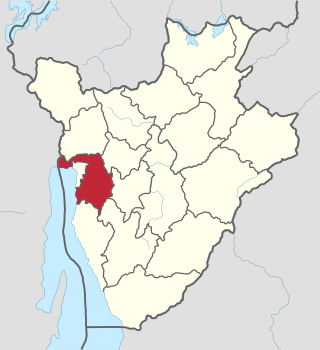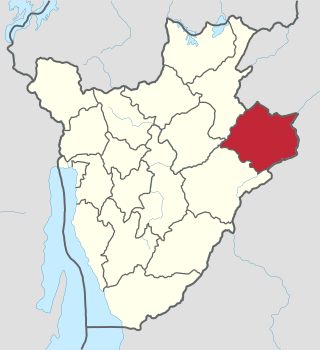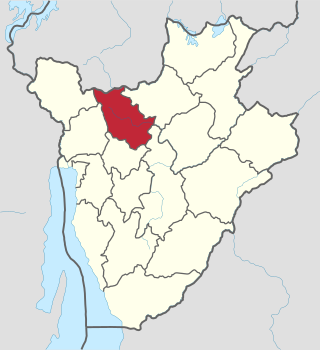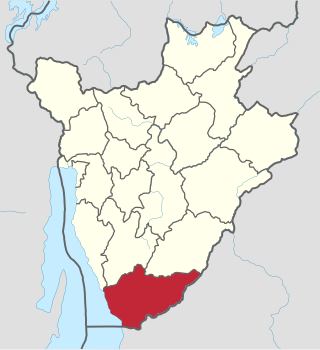Cibitoke Province | |
|---|---|
 | |
| Country | |
| Capital | Cibitoke |
| Area | |
| • Total | 1,635.52 km2 (631.48 sq mi) |
| Population (2008 census) | |
| • Total | 460,435 |
| • Density | 280/km2 (730/sq mi) |
Cibitoke Province is one of the 18 provinces of Republic of Burundi. [1]
Cibitoke Province | |
|---|---|
 | |
| Country | |
| Capital | Cibitoke |
| Area | |
| • Total | 1,635.52 km2 (631.48 sq mi) |
| Population (2008 census) | |
| • Total | 460,435 |
| • Density | 280/km2 (730/sq mi) |
Cibitoke Province is one of the 18 provinces of Republic of Burundi. [1]
It is divided administratively into the following communes:

Bujumbura, formerly Usumbura, is the economic capital, largest city and main port of Burundi. It ships most of the country's chief export, coffee, as well as cotton and tin ore. Bujumbura was formerly the country's normal capital. In late December 2018, Burundian president Pierre Nkurunziza announced that he would follow through on a 2007 promise to return Gitega its former political capital status, with Bujumbura remaining as economical capital and center of commerce. A vote in the Parliament of Burundi made the change official on 16 January 2019, with all branches of government expected to move to Gitega within three years.

Burundi is divided into eighteen provinces, each named after their respective capital with the exception of Bujumbura Rural.

Bubanza is one of the 18 provinces of Burundi.

Bujumbura Rural Province is one of the 18 provinces of Burundi. Former President of Burundi Cyprien Ntaryamira was born here.

Bururi Province is one of the eighteen provinces of Burundi. It was formerly Burundi's largest province until the communes of Burambi, Buyengero and Rumonge were transferred to the province of Rumonge when it was created in 2015.

Cankuzo Province is one of the 18 provinces of Burundi. Located in the eastern part of the country, the province covers an area of 1,965 km2. The provincial capital is Cankuzo. It is Burundi's least populated province.

Kayanza Province is one of the 18 provinces of Burundi. Its capital city is also called Kayanza centre.

Makamba Province is the southernmost province of Burundi. The province has a population of 430,899 and covers an area of 1,960 km2. The provincial capital is Makamba. Makamba has six communes, many refugees have returned from Tanzania to this province, especially to the communes of Kayogoro, Nyanza lac, Mabanda and Vugizo. This causes a big problem, because there is not enough land for everybody. It is the most fertile province of Burundi.

Ngozi Province is one of the 18 provinces of Burundi.

Gitega is one of the 18 provinces of Burundi. Its capital is Gitega, which is also the national capital. It has a population of 725,223 as of 2008 and an area of 1,979 square kilometres (764 sq mi).

The provinces of Burundi are subdivided into 119 communes. The communes are further subdivided into collines.

Islam is a minority religion in Burundi where approximately 90 percent of the national population are followers of Christianity. Between 2–5 percent of the population identifies as Muslim, according to a 2010 estimate by the United States Department of State. The same year, the Pew Research Centre estimated that there were 230,000 Muslims in Burundi, equivalent to 2.8 percent of Burundi's 8.4 million inhabitants.
Ngozi is a town located in northern Burundi. It is the largest urban center in the Ngozi Province and the location of the provincial headquarters.

Burundi, officially the Republic of Burundi, is a landlocked country in the Great Rift Valley at the junction between the African Great Lakes region and East Africa. It is bordered by Rwanda to the north, Tanzania to the east and southeast, and the Democratic Republic of the Congo to the west; Lake Tanganyika lies along its southwestern border. The capital cities are Gitega and Bujumbura, the latter being the country's largest city.
Beșalma is a commune and village in the Gagauz Autonomous Territorial Unit of the Republic of Moldova. The 2004 census listed the commune as having a population of 4,441 people, including 4,293 ethnic Gagauz, 44 Moldovans, 37 Ukrainians, 33 Russians, 25 Bulgarians and 5 Romanians.
Salto del Nilahue is a waterfall located in the commune of Lago Ranco in southern Chile. It lies in the lower flows of Nilahue River.
N'Gonga is a village and rural commune in Niger.
Ouled Aiche is a town and commune in Relizane Province, Algeria.
Bridge River Delta Provincial Park is a provincial park in British Columbia, Canada, located 65 kilometres (40 mi) north of Pemberton and 80 kilometres (50 mi) west of Lillooet. Established in 2010, the park covers 992 hectares.

Rumonge Province is one of the eighteen provinces of Burundi. It was created on 26 March 2015 by combining the communes of Burambi, Buyengero and Rumonge, previously part of Bururi Province, with the Bugarama and Muhuta communes previously belonging to Bujumbura Rural Province.